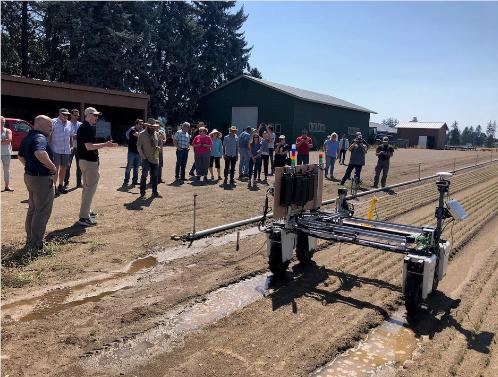University of IdahoA team of computer science researchers at the University of Coeur d'Alene has successfully demonstrated an autonomous robot that uses artificial intelligence (AI) to precisely kill weeds. The three-foot-wide, wheeled robot is able to scan, identify and precisely strike weeds as small as half an inch wide, eradicating them with an electric shock.

existUSAAfter the demonstration at the Forest Service's Coeur d'Alene nursery, the team plans to add a rainproof casing to the robot's hardware, improve the electrical components, and increase the accuracy of the AI in identifying weeds. Data collection and testing will continue into next year.
Designed in partnership with the U.S. Department of Agriculture (USDA), the robot is intended to improve reforestation efficiency within the national forest system. The University of Idaho announced in January that it had received a $139,000 award from the USDA to develop the system as part of Project Evergreen.
“This is about sustainability,” said Kas Dumroese, a former Forest Service senior research scientist. “The robotic equipment developed at the University of Idaho embodies the Forest Service’s commitment to conservation leadership and biodiversity. Automated weeding will reduce labor costs and reliance on chemical pesticides and fossil fuels, improve native plant resilience, and enhance reforestation efforts.”
Coeur d'Alene Nursery is one of six Forest Service facilities nationwide, and the Forest Service spends up to $500,000 a year on controlling weeds in the nursery, much of which is done by hand. Reducing weeds helps the trees better absorb soil nutrients, which reduces nursery costs and improves reforestation results.
The Forest Service was tasked with increasing its reforestation efforts under the REPLANT Act, part of the Infrastructure Investment and Jobs Act of 2021, with the goal of reforesting 4 million acres of U.S. forests and planting more than 1.2 billion trees over the next decade.
“This work is a win-win for both the Forest Service and the university,” Dumroese said in announcing the initial funding. “The university uses its expertise and facilities to develop intelligent robots while developing students’ professional skills in this field. For the Forest Service, this collaboration helps meet the requirements of the REPLANT Act, achieve the sustainability goals of our national forests, and provide benefits to the public.”